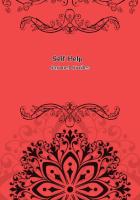One beautiful morning in May, Lillian went out alone to sketch.
The beauty of the sky and sea tempted her; fleecy-white clouds floated gently over the blue heavens; the sun shone upon the water until, at times, it resembled a huge sea of rippling gold.
Far off in the distance were the shining white sails of two boats; they looked in the golden haze like the brilliant wings of some bright bird. The sun upon the white sails struck her fancy, and she wanted to sketch the effect.
It was the kind of morning that makes life seem all beauty and gladness, even if the heart is weighed down with care. It was a luxury merely to live and breathe. The leaves were all springing in the woods; the meadows were green; wild flowers blossomed by the hedge-rows; the birds sang gayly of the coming summer; the white hawthorn threw its rich fragrance all around, and the yellow broom bloomed on the cliffs.
As she sat there, Lillian was indeed a fair picture herself on that May morning; the sweet, spirituelle face; the noble head with its crown of golden hair; the violet eyes, so full of thought; the sensitive lips, sweet yet firm; the white forehead, the throne of intellect. The little fingers that moved rapidly and gracefully over the drawing were white and shapely; there was a delicate rose-leaf flush in the pretty hand. She looked fair and tranquil as the morning itself.
The pure, sweet face had no touch of fire or passion; its serenity was all unmoved; the world had never breathed on the innocent, child-like mind. A white lily was not more pure and stainless than the young girl who sat amid the purple heather, sketching the white, far-off sails.
So intent was Lillian upon her drawing that she did not hear light, rapid steps coming near; she was not aroused until a rich musical voice called, "Lillian, if you have not changed into stone or statue, do speak." Then, looking up, she saw Beatrice by her side.
"Lay down your pencils and talk to me," said Beatrice, imperiously. "How unkind of you, the only human being in this place who can talk, to come here all by yourself! What do you think was to become of me?"
"I thought you were reading to mamma," said Lillian, quietly.
"Reading!" exclaimed Beatrice. "You know I am tired of reading, tired of writing, tired of sewing, tired of everything I have to do."
Lillian looked up in wonder at the beautiful, restless face.
"Do not look 'good' at me," said Beatrice, impatiently. "I am tired to death of it all. I want some change. Do you think any girls in the world lead such lives as we do--shut up in a rambling old farm house, studying from morn to night; shut in on one side by that tiresome sea, imprisoned on the other by fields and woods? How can you take it so quietly, Lillian? I am wearied to death."
"Something has disturbed you this morning," said Lillian, gently.
"That is like mamma," cried Beatrice; "just her very tone and words. She does not understand, you do not understand; mamma's life satisfies her, your life contents you; mine does not content me--it is all vague and empty. I should welcome anything that changed this monotony; even sorrow would be better than this dead level--one day so like another, I can never distinguish them."
"My dear Beatrice, think of what you are saying," said Lillian.
"I am tired of thinking," said Beatrice; "for the last ten years I have been told to 'think' and 'reflect.' I have thought all I can; I want a fresh subject."
"Think how beautiful those far-off white sails look," said Lillian--"how they gleam in the sunshine. See, that one looks like a mysterious hand raised to beckon us away."
"Such ideas are very well for you, Lillian," retorted Beatrice.
"I see nothing in them. Look at the stories we read; how different those girls are from us! They have fathers, brothers, and friends; they have jewels and dresses; they have handsome admirers, who pay them homage; they dance, ride, and enjoy themselves. Now look at us, shut up here with old and serious people."
"Hush, Beatrice," said Lillian; "mamma is not old."
"Not in years, perhaps," replied Beatrice; "but she seems to me old in sorrow. She is never gay nor light-hearted. Mrs. Vyvian is very kind, but she never laughs. Is every one sad and unhappy, I wonder? Oh, Lillian, I long to see the world--the bright, gay world--over the sea there. I long for it as an imprisoned bird longs for fresh air and green woods."
"You would not find it all happiness," said Lillian, sagely.
"Spare me all truism," cried Beatrice. "Ah, sister, I am tired of all this; for eleven years the sea has been singing the same songs; those waves rise and fall as they did a hundred years since; the birds sing the same story; the sun shines the same; even the shadow of the great elms fall over the meadow just as it did when we first played there. I long to away from the sound of the sea and the rustling of the elm trees. I want to be where there are girls of my own age, and do as they do. It seems to me we shall go on reading and writing, sewing and drawing, and taking what mamma calls instructive rambles until our heads grow gray."
"It is not so bad as that, Beatrice," laughed Lillian. "Lady Earle says papa must return some day; then we shall all go to him."
"I never believe one word of it," said Beatrice, undauntedly.
"At times I could almost declare papa himself was a myth. Why do we not live with him? Why does he never write? We never hear of or from him, save through Lady Earle; besides, Lillian, what do you think I heard Mrs. Vyvian say once to grandmamma? It was that we might not go to Earlescourt at all--that if papa did not return, or died young, all would go to a Mr. Lionel Dacre, and we should remain here. Imagine that fate--living a long life and dying at the Elms!"
"It is all conjecture," said her sister. "Try to be more contented, Beatrice. We do not make our own lives, we have not the control of our own destiny."
"I should like to control mine," sighed Beatrice.















